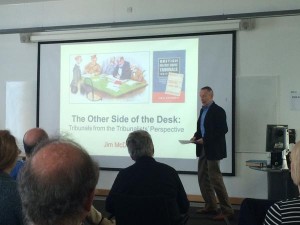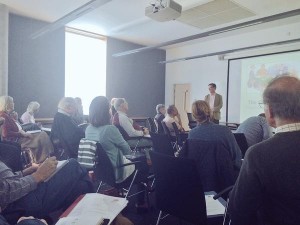About 35 people spent a sunny Saturday thinking about the introduction of conscription in 1916 and the work of the military service tribunals. Participants came from Staffordshire, London and Essex, as well as from Hertfordshire, and joined in discovering the largely untold story of how the tribunals worked and the stories of those who came before them.
To read some initial thoughts on the day click on the continue reading button below.
To see edited clips of talks and link to the full film of the day click here
 Initial thoughts on the Military Tribunal Workshop
Initial thoughts on the Military Tribunal Workshop
- The overwhelming impression left by the workshop was the sheer scale of the phenomenon. In St Albans for example, almost half of the men potentially available for military service in 1915/16, applied for exemption.
- New sources of evidence are emerging: it’s now clear that papers were not routinely destroyed in the 1920s as previously thought. And where minute books have not survived, local newspapers provide detailed accounts of tribunal business. Conscientious objection cases were often reported in more detail than other ones, but the specialist press kept an eye on decisions relevant to men in particular occupations.
- While this period is generally remembered in terms of conscientious objection to military service, it was on grounds of personal hardship or business survival that most appeals were made. Jim McDermott commented that if around 1% of appeals were on grounds of conscience, they are the focus of about 95% of the histories of conscription.
- In Northamptonshire alone, Sally Sokoloff estimates that between 80,000 and 90,000 appealed against the call to military service.
- Like conscientious objection, the white feather campaign has left an apparently indelible mark on popular memory. However the scale of appeals suggests that many men felt that it was acceptable to resist conscription, and that the decision to stay at home was regarded as a loyal and defensible one.

- Close study of the papers, of the handwriting, typewriters and even turns of phrase, suggests that knowledge of how to appeal was pooled and shared. While we may never be able to reconstruct it, conscription was, in Sally Sokoloff’s words, ‘a hidden conversation of the home front’.
- Successive measures to conscript civilians followed closely on the heels of military disasters, panic about German victory and anxiety about national survival. German victory on the Eastern Front against Russia in 1915 was the ‘game changer’ with the scale of French casualties on the Western Front forcing the British government to look for new sources of labour.
- And why was working for the local hunt reason for exemption from military service? Hunting was valuable recreation for officers home on leave.
If you know of surviving papers from military service tribunals, do please let us know and we will bring the information together on our website. You can also follow the story of the day at https://storify.com/FWWLives/military-services-tribunal




